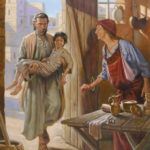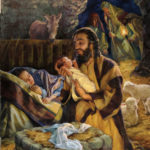The text for this lesson is Exodus 12:1–28; 13:14
Key Point
- God protected His people from danger and rescued them from their enemies. God protects me from danger and rescues me from my enemies: sin, death, and the devil.
- Law: Because of sin, I deserve death and eternal condemnation.
- Gospel: God, who is rich in mercy, pours out His wrath on an innocent sacrifice instead. The Passover lamb points forward to Jesus, the Lamb of God, who took the punishment I deserve on the cross; in the paschal feast of the Lord’s Supper, He gives us forgiveness, life, and salvation.
Context
At this point in the account, Moses has already told Pharaoh to let God’s people go on nine separate occasions, and God has sent nine plagues on Egypt to try to persuade Pharaoh to obey His command. In each and every case, Pharaoh ultimately refuses to obey God’s command. Instead, Pharaoh makes the Israelites’ work more difficult, and even though he initially agrees to free the Israelites, he changes his mind before they leave. The Egyptian magicians have replicated some of the plagues, but they have been unable to end them or replicate them all. The tenth and final plague will strike Pharaoh’s own house, and he will, at last, set the Israelites free.
Commentary
The Passover is the Old Testament sacramental means through which God provides for the salvation of His people. The key text is Exodus 12:13: “The blood shall be a sign for you, on the houses where you are. And when I see the blood, I will pass over you, and no plague will befall you to destroy you, when I strike the land of Egypt.” The blood of the lamb is combined with the word of God’s promise. The two together result in the salvation of the firstborn of Israel.
The Passover is one of the chief ways in which the New Testament speaks of Jesus’ redemption of all humanity. John the Baptist proclaims, “Behold, the Lamb of God, who takes away the sin of the world!” (John 1:29). The blood of the Passover lamb covered the sins of each family so that the wrath of God would not fall on the house. Jesus is the Passover Lamb for God’s family, which is the whole world (3:16). This language is beautifully expressed in the Church’s Collect for Good Friday in which we say to God, “Graciously behold this Your family for whom our Lord Jesus Christ was willing to be betrayed and delivered into the hands of sinful men to suffer death upon the cross” (LSB Altar Book, p. 592).






